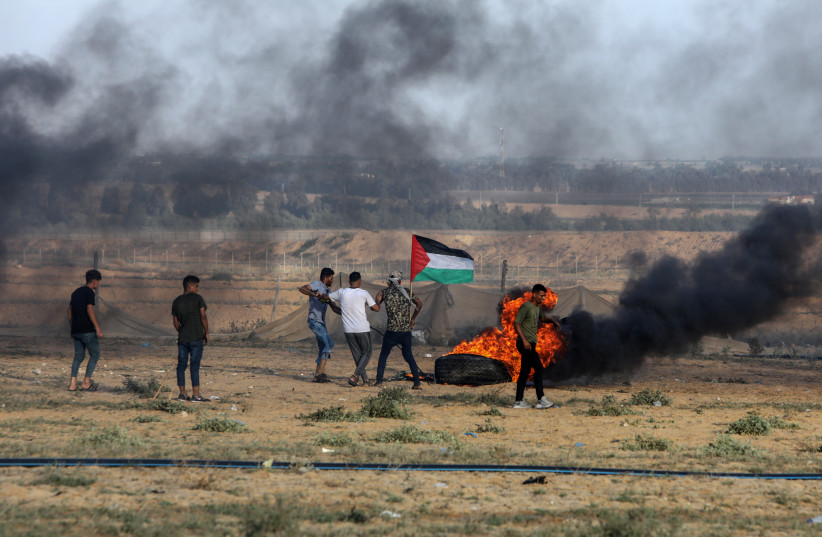Over the last two months, several reports have indicated that large influential family clans could play a role in Gaza in areas where Hamas has been defeated, and where there is a power vacuum.
This is one of the story arcs to emerge from the lack of any civilian authority to control these parts of Gaza where Hamas is absent. Israel has preferred not to have the Palestinian Authority take that place. It is also unclear whether the PA would agree to work with Israel in this respect at all.
So this leaves few options. The IDF has preferred not to run Gazan civilian affairs, which means that where there are civilians, they are generally separated from the military.
In northern Gaza, there are around 300,000 Palestinians. While Hamas is defeated on the surface, it continues to retain hold among the population. Many fear the creation of an alternative to Hamas because they think Hamas will return and enact revenge.
The only powerful groups that might provide a shield against Hamas atrocities in the future are large clans because even Hamas fears angering large families that have influence and power and may have weapons as well. London-based Arabic daily Asharq Al-Awsat reported on Saturday that the IDF began to take steps to test the rule of local clans in the enclave.

In January, a different report claimed that Israel was looking into the idea of having clans take over administration in some areas. This dovetails with the idea of having humanitarian pockets in Gaza. However, as the stampede near the trucks last Thursday in Gaza illustrates, no such plan has materialized yet.
Is partnership possible?
Can it work though? Iraq is an interesting test case: Clans and tribes played a key role after the US toppled the Saddam regime, even helping in some cases to defeat the extremist insurgency that emerged between 2005 and 2008.
This “Sunni awakening” movement took place in western Iraq in Anbar province. It was a viable alternative but didn’t work in the long term. When ISIS turned up in Iraq in 2014, it easily pushed aside Sunni clans and tribes, though some held on, such as the Jughayfa tribe in Haditha and the large Shammar tribe in Iraq and Syria.
In general, tribes and clans are important, but they are not a substitute for a state or state-like structures; they also do not weather the storm, when push comes to shove. They tend to thrive when there is a severe power vacuum, and people rely on family connections and families to survive.
AT THE end of the day though, historically in this region, organized political, military, and terrorist movements generally win out when they face off against clans and tribes. There are exceptions, such as states that are rooted in large tribes, or those that rely on them as pillars of the defense forces, or to control certain areas of a country by co-opting them.
Israel has a long history of working with local clans and groups or tribes in various capacities. For instance, early Israeli leaders enjoyed good relations with some Bedouin tribes in the Negev and the Galilee. In the 1950s and 1960s, many local traditional Arab leaders had relatively decent relations with the authorities, in contrast to some of the urban educated elites who were influenced by Arab Nationalism and communism. When Israel ran the Sinai in the 1970s, Israel enjoyed relatively amicable relations with some of the Bedouin tribes there.
These ties only got so far, though. Gaza changed drastically from the 1950s until the 1980s. There are clans in Gaza, and there are plenty of people who resent Hamas’s rule. But Hamas’s genocidal attack on Israel on October 7 shows that the group is willing to commit extreme massacres and that it enjoys impunity to do so. Hamas is backed by Turkey, a member of NATO, and it is hosted by Qatar, a major non-NATO ally of the West.
That means that, unlike various clans in Gaza, it has extensive international support. It has often partnered with international NGOs and UN organizations, either openly or covertly, by supplying its police to “guard” aid convoys, for instance. Unlike in Iraq or Syria, where various tribal elements may have such power that they can sit in the room with leaders of states, the clans in Gaza do not enjoy regional clout, at least not visibly.
The challenge of Gaza’s power vacuum will need to be solved. Whether various clans and tribes can play a role remains to be seen. Hamas has shown, like ISIS, that it is willing to use any means to continue to control things. ISIS also massacred tribes when it came to power in places like the Euphrates Valley in Syria.
Tribes and clans can help with local governance, but they value their lives as well, and they have spent hundreds of years reading which way the wind blows in the region and making the complex choices that locals have to make in this region, where local people are often abandoned to the whims of various regimes and groups.
